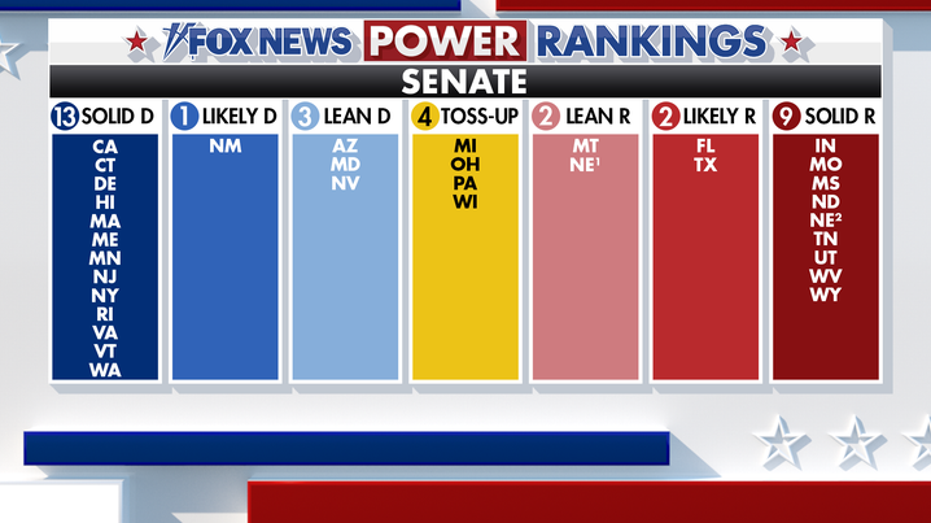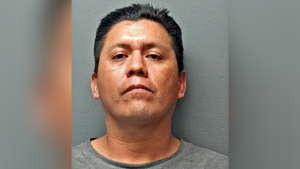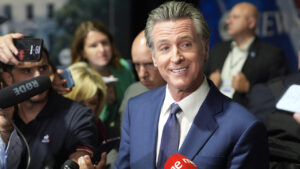
Nine competitive races in Michigan, Ohio, Pennsylvania, Wisconsin, Montana, Nebraska, Arizona, Maryland and Nevada could determine control of the Senate.
Nine competitive Senate races will likely determine which party controls the upper chamber of Congress.
Democrats are fighting to retain their narrow 51-49 majority in the Senate. Democrats are defending 23 seats, including three held by independents who caucus with them. That’s compared with just 11 seats that Republicans hope to keep in their column, according to the Associated Press.
The Senate races in Michigan, Ohio, Pennsylvania and Wisconsin are considered Toss-Ups, according to the latest Fox News Power Rankings. The Montana and Nebraska races for Senate are considered leaning Republican, while the Senate contests in Arizona, Maryland and Nevada lean Democrat on Election Day.
In Michigan, Rep. Elissa Slotkin, a Democrat, and Republican candidate Mike Rogers are facing off for a chance to replace Sen. Debbie Stabenow, a Democrat who is concluding her 24-year Senate career.
It could be the best chance Republicans have had in decades of winning a Senate seat in Michigan. The last time a Republican secured election to the upper chamber was in 1994, when Spencer Abraham defeated Democrat Bob Carr by 10 points. Abraham later lost to Stabenow in 2000.
STEFANIK SLAMS DEMOCRATS’ ‘SCARE TACTICS’ ON TRUMP’S RECORD WITH WOMEN ON IVF, ABORTION
Rogers was elected to Congress in 2000 and represented Michigan’s 8th District until 2014. The once chair of the House Intelligence Committee, the Republican served as a commissioned officer in the U.S. Army through the Reserve Officers’ Training Corps and later worked as a special agent in the FBI.
Slotkin, who currently represents Michigan’s 7th District, has worked for the CIA and the U.S. Department of Defense and served three tours in Iraq. Both campaigns have focused on concerns over Chinese influence and highlighted their security experience in the Middle East and domestically.
In Ohio, Democratic incumbent Sen. Sherrod Brown faces a challenge from Republican Bernie Moreno in what’s projected to be the most expensive race outside the presidential contest, according to the Marion Star, given the outcome could determine which party controls the upper chamber of Congress.
Former President Trump endorsed Moreno earlier this year in the Senate Republican primary.
Moreno briefly ran for Senate in 2022 to replace retiring Republican Sen. Rob Portman, but JD Vance, now Trump’s vice presidential running mate, won the nomination and later the general election.
Trump carried Ohio by eight points in both the 2016 and 2020 elections.
In Pennsylvania, considered a pivotal battleground in the presidential race, incumbent Democratic Sen. Bob Casey is up against Republican challenger Dave McCormick.
McCormick, a West Point graduate who served in Iraq in the 82nd Airborne Division and later as the CEO of the world’s largest hedge fund, took the stage ahead of Trump at the Republican presidential nominee’s last rally in the state Monday night. McCormick told a Pittsburgh crowd that his opponent, Casey, was a “career politician” with more than 30 years in office, before also attacking Vice President Harris.
McCormick previously ran an unsuccessful primary bid for Senate in 2022, losing the nomination to Dr. Mehmet Oz. Oz was defeated by Democrat John Fetterman.
Casey, whose father served as governor for two terms, is one of the most recognized politicians in the state. He is seeking a fourth term in the Senate and has been successful in six statewide elections since 1996.
Wisconsin’s hotly contested Senate race pits two-term Democratic incumbent Tammy Baldwin against Republican Eric Hovde, a millionaire businessman backed by Trump who poured millions of his own money into the contest.
While Baldwin’s voting record is liberal, she emphasized bipartisanship throughout the campaign. Baldwin became the first statewide Democratic candidate to win an endorsement from the Wisconsin Farm Bureau, the state’s largest farm organization, in more than 20 years.
Her first television ad noted that her buy-American bill was signed into law by Trump. In July, she touted Senate committee approval of a bill she co-authored with Trump’s running mate, Sen. JD Vance, that seeks to ensure that taxpayer-funded inventions are manufactured in the United States.
Hovde has portrayed Baldwin as an out-of-touch liberal career politician who didn’t do enough to combat inflation, illegal immigration and crime. He has stressed that Baldwin has been in elected office since 1987, including the past 12 years in the Senate and 14 in the House before that.
Hovde’s wealth, primarily his management of Utah-based Sunwest Bank and ownership of a $7 million Laguna Beach, California, estate, has been a key line of attack from Baldwin, who has tried to cast him as an outsider who doesn’t represent Wisconsin values.
Three-term incumbent Democratic Sen. Jon Tester of Montana faces perhaps his toughest election challenge yet on Tuesday, with control of the Senate on the line in a state that’s veered sharply rightward since the 68-year-old grain farmer’s first election.
Republicans have pinned their hopes on Tim Sheehy, a former U.S. Navy SEAL and founder of an aerial firefighting company. Sheehy, 38, had early backing from party leaders, including Trump, clearing the political newcomer’s path to win the June primary.
This is the first time Tester’s name appears on the same ballot as Trump, who won Montana by wide margins in 2016 and 2020.
A Sheehy victory would seal Republican Party dominance across the five-state Northern Plains region: Tester entered office as one of six Democratic senators in the largely rural swath of American heartland that also includes Wyoming, Nebraska, North Dakota and South Dakota. He’s now the only one.
The lawmaker also is the sole remaining Democrat to hold statewide office in Montana.
Two-term Republican Sen. Deb Fischer faces her strongest re-election challenge yet Tuesday as she takes Dan Osborn, a former labor union boss who eschewed both major political parties to run as an independent while painting himself as a working class champion.
The state GOP, whose leadership is loyal to Trump, endorsed primary challengers to all five of the Republicans who represent Nebraska in Congress, including Fischer.
Fischer held a recent news conference to showcase the backing of several state Republicans, including popular former Gov. Dave Heineman. She also leaned into her support for Trump, despite having called for him to leave the 2016 race in response to the notorious “Access Hollywood” tape.
Trump has endorsed Fischer for re-election, which she has touted in her campaign ads.
Osborn, a 20-year industrial mechanic and veteran of the Navy and Nebraska Army National Guard, successfully led a 2021 strike at the Kellogg’s cereal plant in Omaha to gain higher wages for roughly 1,400 workers following a year in which the company saw soaring revenue.
Osborn has leaned into that background in centering his platform on what he says is a need for equitable economic policies. In his political ads, he’s contrasted his own story with Fischer’s, accusing her of enriching herself while in office as average families struggle financially.
Well-known former television news anchor and staunch Trump ally Kari Lake is competing against Democratic Rep. Ruben Gallego, an Iraq War veteran, in Tuesday’s election for U.S. Senate in a state with a recent history of extremely close elections.
The winner of the Senate race will replace Kyrsten Sinema, who left the Democratic Party two years ago.
Lake made national headlines with her 2022 campaign for Arizona governor. She has never acknowledged losing that race and called herself the “lawful governor” in her 2023 book, according to the Associated Press. She continued her unsuccessful fight in court to overturn it even after beginning her Senate campaign, and, as recently as last week refused to admit defeat in a contentious CNN interview.
Lake has focused on border security in her Senate campaign.
Gallego, who enlisted in the U.S. Marine Corps Reserve and fought in Iraq in 2005 in a unit that sustained heavy casualties, has relentlessly attacked Lake’s support for a state law dating to the Civil War that outlawed abortions under nearly all circumstances. Lake has tacked to the middle on the abortion issue.
Larry Hogan, a popular Republican who won two terms as governor, is the most competitive candidate for the GOP in years in the race to replace retiring Democratic Sen. Ben Cardin. Still, he is facing an uphill battle against Democrat Angela Alsobrooks, the county executive of Prince George’s County, who could make history as the state’s first Black U.S. senator in a state where Democrats outnumber Republicans 2-1.
The stakes are unusually high for a Maryland race that includes a Republican who won significant Democratic support in his 2014 and 2018 gubernatorial victories. Hogan is only the second Republican in Maryland history to be re-elected governor.
Abortion has been a major issue in a campaign taking place at the same time that voters in Maryland and eight other states will be considering a constitutional amendment to enshrine abortion rights in the state constitution, after the U.S. Supreme Court struck down Roe v. Wade in 2022.
Alsobrooks has prioritized abortion rights in her campaign, saying one of her first actions as a senator would be to sponsor legislation to codify Roe into federal law. Hogan also says he would co-sponsor such legislation, but Alsobrooks is quick to point to a Hogan veto when he was governor of a bill in Maryland to expand abortion access in 2022.
In a presidential swing state, Democratic Sen. Jacky Rosen – a former computer programmer and synagogue president – is facing a challenge from Republican Sam Brown, a retired Army captain whose face is still scarred from injuries he suffered in Afghanistan.
The first-term Rosen has outspent Brown by more than 3-1 in the contest, positioning herself as a nonideological senator who delivers for her home state on issues like broadband internet access and a high-speed rail connection with Southern California.
Brown, who was awarded the Purple Heart, has campaigned on his biography and the state’s cost-of-living crisis, particularly acute in working-class Nevada. He’s had trouble gaining traction, though a last-minute infusion of GOP money in late October came as Republicans, cheered by strong turnout for their party in early voting, hoped Brown could upend expectations in the race.
Trump endorsed Brown in the state’s primary.





